Europe’s buzzing AI landscape proves that it’s not just the tech giants that shine; the underdogs, particularly AI startups in Europe, are leading the charge. These startups aren’t just competing; they’re redefining the boundaries of what’s possible with artificial intelligence, transforming industries at an unprecedented pace and scale.
In this article, we’ll explore:
- The AI startups in Europe are trailblazing new paths.
- Their transformative impact across various sectors.
- The unique challenges they face and the opportunities they harness.
- Collaborative efforts that are setting new benchmarks.
- A forward-looking perspective on Europe’s AI ecosystem.
P.S., Looking to hop on the AI train to keep up with the competition? European businesses today that may not have the AI expertise in-house, opt for AI development services by companies like Miquido. This allows them to tap into the world’s leading talent in generative AI, machine learning, virtual assistants, data science, and computer vision. If you’re interested, get in touch with us today to learn about what we’ve been up to in the AI space.
Quick Review
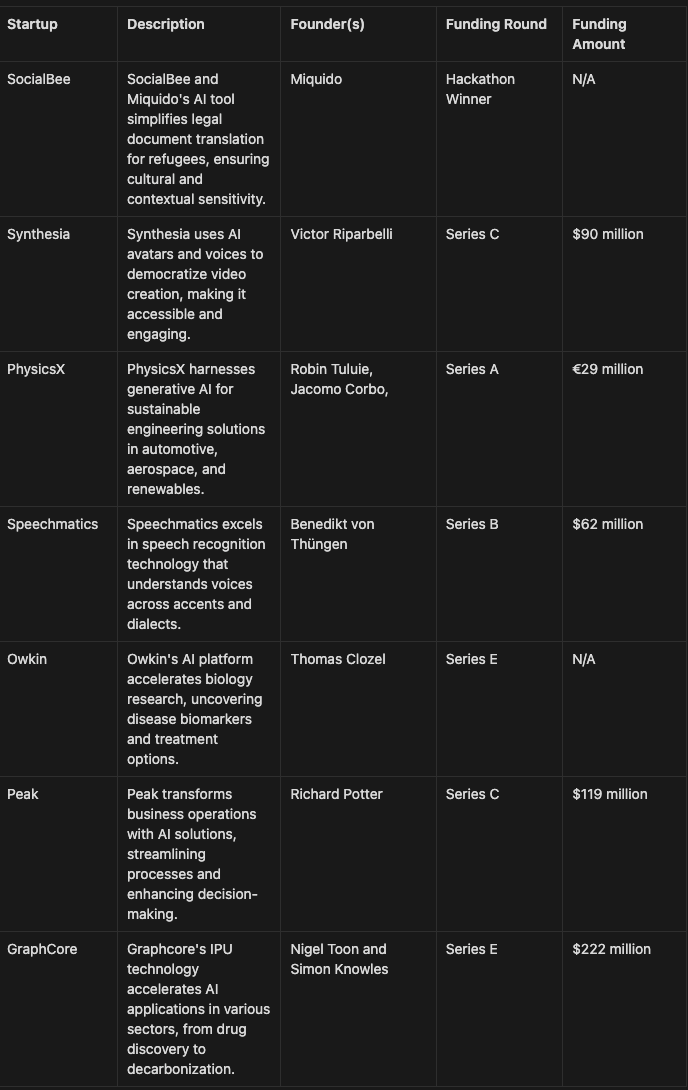
Europe’s AI landscape is buzzing, and it’s not just talk. The continent is on an upward trajectory, with funding in European AI startups reaching $52 billion in 2023. What’s driving this surge? A perfect storm of tech talent, ethical AI frameworks, and a startup ecosystem that’s as dynamic as it gets.
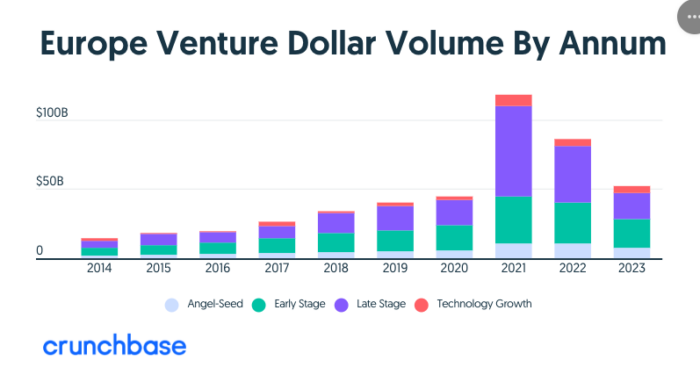
But here’s a number that really pops: 40% of European startups now use AI in some form. That’s nearly half of all startups integrating AI into their operations, from customer service chatbots to advanced data analytics.
Investment in AI is steadily increasing, with European AI startups securing significant funding rounds.
Collaboration between the public sector, academia, and private enterprises is a hallmark of Europe’s AI ecosystem. Initiatives like the European AI Alliance and various EU-funded research projects underscore a collective drive towards advancing AI technology while addressing societal challenges.
Criteria for Selection of the “Best” AI Startups
Picking the cream of the crop among Europe’s AI startups isn’t just about who’s got the coolest tech. It’s about innovation, financial grit, and the impact that makes you sit up and take notice. So, what makes the best AI startups in Europe stand out? Let’s dive in.
- Innovation: First off, innovation is key. The top AI startups in Europe aren’t just following trends but setting them. They’re turning “What if?” into “What’s next?” with AI solutions and existing products that aim to redefine their industries. It’s about breakthrough ideas that push the boundaries of AI, from revolutionizing healthcare diagnostics to making autonomous vehicles more competent and safer.
- Financial Performance: The best startups show solid growth, sustainable business models, and the kind of revenue numbers that make investors and entrepreneurs’ hearts beat faster. For instance, while European tech funding halved to pre-Covid levels, 11 AI companies raised mega funding rounds of $100 million or more.
- Impact: The best AI startups are the ones making a real difference—whether that’s by tackling climate change, transforming education, or democratizing healthcare. They’re the startups whose AI projects have a clear, positive effect on society and the economy, marking them as leaders in their field.
- Scalability: Scalability is another biggie. The top startups have solutions that aren’t just brilliant; they’re built to grow. They can handle increasing users, expanding markets, and evolving tech landscapes without sweat. This scalability shows they’re not just a flash in the pan but ready for the global stage.
- Team and Leadership: Behind every great AI startup is an even greater team. Leadership and talent are crucial. The best startups boast a mix of visionary leaders, savvy business minds, and tech geniuses who can turn AI dreams into reality. It’s about having a team that’s as diverse as it is skilled, driving innovation from the drawing board to the real world.
- Customer Success: Last but not least, customer success stories are the proof in the AI pudding. The best AI startups have a lineup of satisfied customers who’ve seen actual results, from boosted efficiency and slashed costs to groundbreaking new capabilities. These success stories aren’t just good PR; they prove that the startup or company’s AI solutions deliver real value.
So, there you have it. The best AI startups in Europe aren’t just about cool tech or big bucks. They’re about innovative solutions, strong financials, meaningful impact, scalability, top-notch teams and employees, and real-world success. These are the startups that aren’t just riding the AI wave; they’re steering it towards a smarter, better future.
1) SocialBee’s AI-powered Legal Translation Tool: A Miquido Project
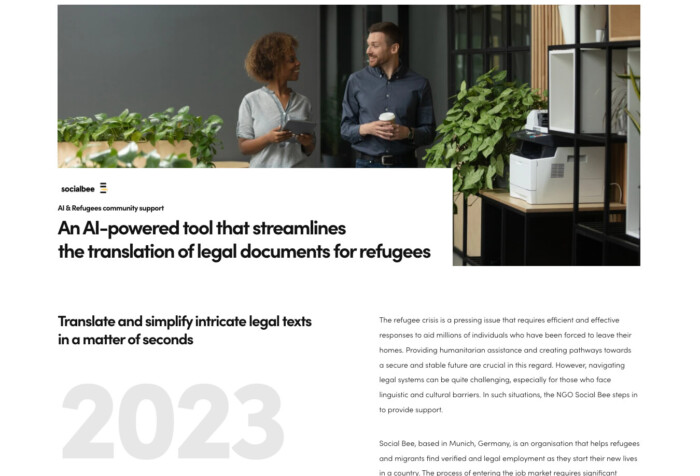
Miquido, based in Munich, Germany, introduces a groundbreaking AI tool in collaboration with Social Bee, designed to streamline the translation of legal documents for refugees. Launched in June 2023 after clinching first place at the Hack To The Rescue hackathon, this solution stands out by making intricate legal texts understandable within seconds. It’s a critical aid for migrants trying to navigate the complexities of a new legal system, offering a beacon of hope and practical assistance.
Key Features
- AI-Powered Translation: Transforms complex legal texts into simplified versions in seconds, tailored for refugees.
- Cultural and Contextual Sensitivity: Ensures translations respect cultural nuances and legal contexts.
- Real-Time Performance: Offers immediate translation to support time-sensitive legal processes.
- Scalability: Designed to handle peak demands, ensuring continuous access to crucial documents.
Pros
- Innovative Solution: First of its kind, addressing a significant gap in humanitarian aid.
- Accuracy and Reliability: Maintains high precision in translations across multiple languages.
- User-Friendly: Easy for all stakeholders, including refugees, volunteers, and legal assistants, to use.
Cons
- Limited Languages: While designed to be accurate, the range of languages supported may be a constraint.
- Adaptation to Legal Changes: Requires continuous updates to keep up with evolving legal frameworks.
This collaboration between Miquido and Social Bee exemplifies how AI can be harnessed to address humanitarian challenges, showcasing the potential for technology to facilitate significant social impact.
2) Synthesia – Democratizing Video Creation
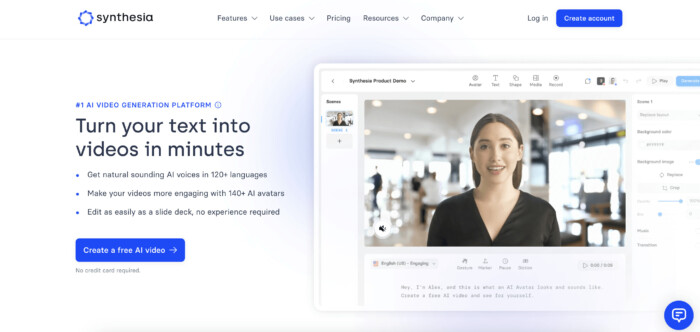
Synthesia, a trailblazer in AI video creation, is making waves from its headquarters in London, UK. Fresh off securing a hefty $90 million in their Series C funding, this venture is on a mission to streamline video production through cutting-edge AI. This recent financial milestone not only injects substantial fuel into their growth engine but also catapults their valuation to an impressive $1 billion.
The investment round, spearheaded by Accel and enriched by contributions from NVentures (NVIDIA’s venture arm), along with steadfast support from Kleiner Perkins, GV, and Firstmark Capital, underscores the industry’s confidence in Synthesia. This fusion of financial backing and visionary tech aims to redefine how videos are produced, making it a beacon for professionals and investors alike.
Key Features
- Diverse AI Avatars and Voices: Offers a wide range of customizable avatars and voices, supporting over 120 languages.
- Text-to-Speech Conversion: Transforms written text into professional voiceovers seamlessly.
- Custom AI Avatars: Allows for the creation of personalized digital twins.
- Gestures and Voice Cloning: Introduces micro-gestures for avatars and enables personal voice cloning for a more authentic video experience.
- AI Script Assistant: Leverages AI to assist in scriptwriting, making content creation more intuitive.
Pros
- Innovative Technology: Pioneering in AI-driven video creation, offering a scalable solution for content production.
- Global Reach: Breaks language barriers, enabling global communication strategies.
- Customization: High degree of personalization in avatars and voiceovers caters to diverse needs.
Cons
- Complexity in Customization: While powerful, the depth of customization may present a learning curve.
- Dependence on AI: The reliance on AI necessitates ongoing updates and refinements to stay ahead.
Synthesia’s AI technology essentially democratizes video content creation. It enables users from various sectors, including education, to produce high-quality, multilingual educational content affordably and efficiently.
This innovation can significantly enhance learning experiences worldwide, making education more accessible and engaging. In corporate settings, it streamlines training and communication, fostering a more informed and skilled workforce. Synthesia’s technology thus stands to bridge communication gaps and foster global understanding, making it a powerful tool for societal advancement.
3) PhysicsX: Engineering the Future with Generative AI
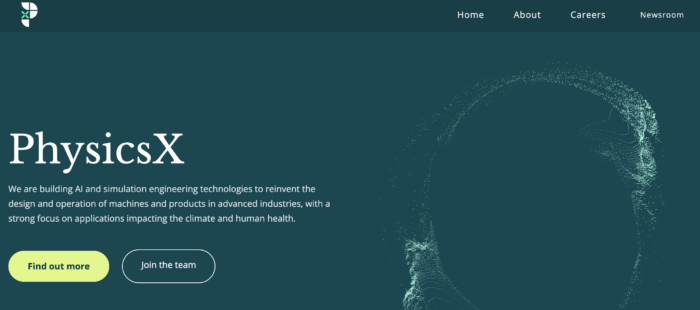
PhysicsX is one of the generative AI startups harnessing technology to revolutionize engineering across pivotal sectors such as automotive, aerospace, renewables, and materials production.
With a €29 million injection from its Series A funding round, led by General Catalyst and supported by industry giants including Standard Investment, NGP Energy, Radius Capital, and KKR’s Henry Kravis, PhysicsX is poised for groundbreaking advancements.
Features That Define PhysicsX
- Generative AI Technologies: Employs cutting-edge AI to innovate design and operation of machinery and products.
- Climate and Health Impact: Focuses on engineering solutions that positively affect climate change and human health.
- Advanced Industry Applications: Targets critical sectors with the potential for significant technological advancements.
Pros:
- Sector-wide Innovation: Opens new possibilities in engineering, especially in sustainability and health.
- High-profile Backing: Strong financial and strategic support signals robust growth potential.
Cons:
- Emerging Technology Risks: The novel application of generative AI in engineering presents uncharted challenges.
- Industry Adoption: Breakthrough technologies often face hurdles in widespread industry adoption.
PhysicsX’s generative AI technology could significantly impact society by pioneering sustainable solutions in critical industries.
For instance, in the automotive sector, it might lead to the development of more efficient, less polluting vehicles, while in aerospace, it could result in lighter, fuel-efficient aircraft designs. In renewables, PhysicsX’s innovations could enhance energy storage and efficiency, propelling us towards a cleaner, more sustainable future. These advancements highlight the potential of PhysicsX to drive significant societal changes through technology.
4) Speechmatics is Perfecting (Yes, Perfecting) How Speech Is Recognized
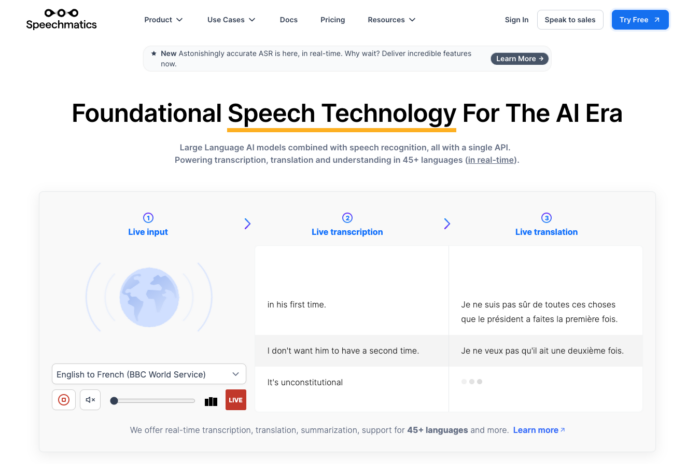
Speechmatics has set a new benchmark in speech recognition technology, designed to understand voices across various accents, dialects, ages, genders, races, or locations. Its Autonomous Speech Recognition software stands out by outperforming industry giants through innovative self-supervised learning, tackling AI bias and inequality head-on.
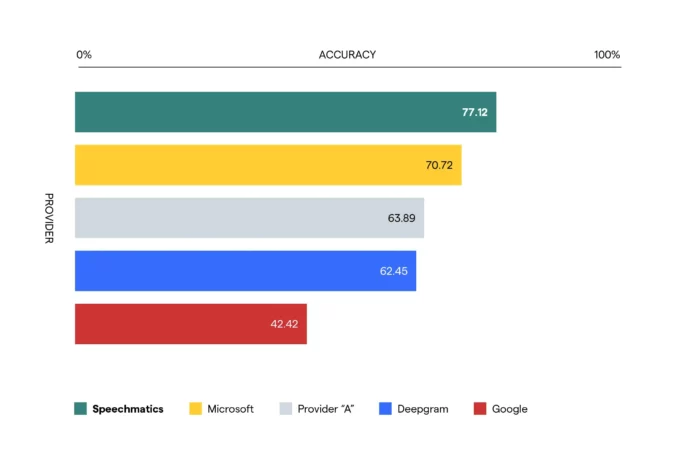
Since its Series A funding in October 2019, the company has witnessed a 240% growth, expanding its global footprint with offices in the US, India, and Europe. And in 2022, the company announced its $62 million Series B funding to expand its business once more, led by Susquehanna Growth Equity out of the U.S., followed by U.K. investors AlbionVC and IQ Capital.
Defining Features
- Inclusive Speech Recognition: Unmatched accuracy across 45+ languages.
- Autonomous Speech Recognition: Advanced self-supervised learning models.
- Global Expansion: Significant growth and global office establishment.
Pros
- Market Leadership: Outpaces tech giants in speech accuracy and inclusivity.
- Rapid Growth: Demonstrates scalability and global demand for advanced speech recognition.
Cons
- Tech Complexity: The advanced nature of the technology may require specialized knowledge for implementation.
- Globalization Challenges: Expansion brings diverse regulatory and operational challenges.
By advancing speech recognition to understand every voice, Speechmatics is tackling crucial issues like inequality and AI bias. This technology can transform customer service, healthcare diagnostics, and educational resources by ensuring that everyone is heard and understood, regardless of their voice’s unique characteristics.
5) Owkin: Pioneering AI in Biology Research
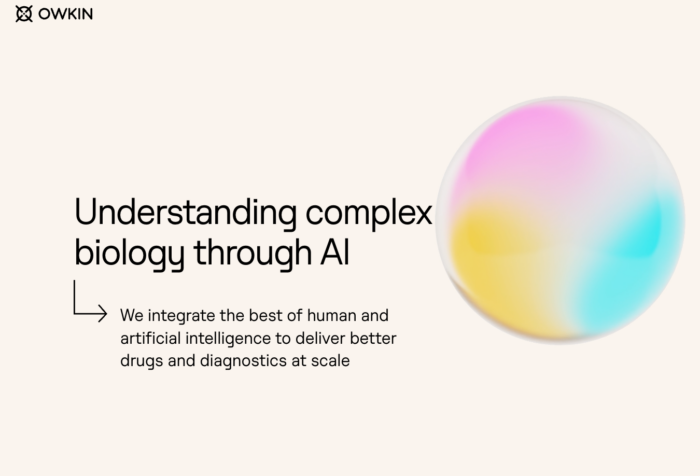
Founded in 2016, Owkin stands out in the French tech landscape as a beacon of innovation in biology research. With a focus on AI, Owkin’s platform is designed to uncover biomarkers and mechanisms linked to diseases and treatment outcomes.
By combining advanced machine learning with biological expertise, they aim to accelerate the discovery and development of novel drug candidates, enhancing the precision and speed of medical research.
Key Features
- AI-Driven Discovery: Harnesses AI for groundbreaking biomarker and drug discovery.
- Data Access & Biology Expertise: Combines secure, extensive data access with deep biological understanding.
- Interpretable AI: Focuses on making AI decisions transparent and actionable.
Pros
- Accelerated Research: Significantly speeds up the discovery and the custom software development process.
- Enhanced Accuracy: Utilizes vast datasets to refine the precision of predictive models.
Cons
- Complex Integration: The advanced nature of AI solutions requires intricate integration into current research methodologies.
- Data Sensitivity: High standards for privacy and ethical considerations in handling sensitive biological data.
Owkin’s AI platform has the potential to transform medical research and healthcare, making disease understanding and treatment development more efficient and effective. By identifying novel biomarkers and drug candidates, Owkin could lead to earlier disease detection and personalized medicine, significantly impacting patient outcomes and the broader healthcare landscape.
6) Peak Supercharges Biz Ops
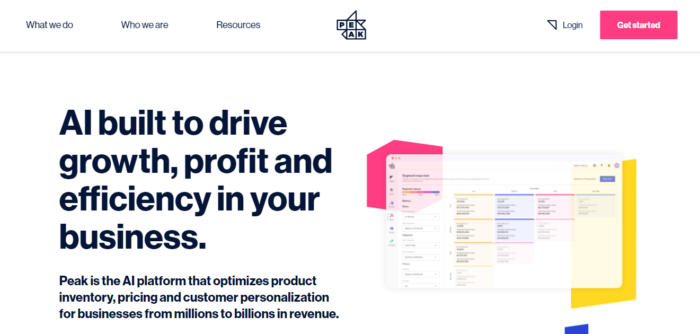
Peak, a company based in the United Kingdom, is at the forefront of transforming business operations with its AI solutions. They’re not just about implementing AI; they’re about embedding it into the core of business processes to drive efficiency, enhance decision-making, and unlock new opportunities.
Peak’s AI automation prowess is backed by significant investment, including a recent $21 million funding round, which later moved to an additional $75 million, led by SoftBank Vision Fund 2, with previous backers Oxx, MMC Ventures, Praetura Ventures and Arete also participating. With a focus on accessibility, Peak’s platform is designed for ease of use, ensuring businesses of all sizes can leverage AI without needing in-depth technical expertise.
Here’s what Peak brings to the table:
- Operational Excellence: Peak’s AI solutions are designed to streamline operations, reducing costs and improving productivity across various business functions.
- Smarter Decisions: By harnessing the power of AI, Peak empowers businesses to make informed, data-driven decisions, fostering growth and innovation.
- Custom AI Solutions: Understanding that no two businesses are alike, Peak offers tailored AI solutions that align with specific business goals and challenges.
Pros:
- Tailored AI solutions that fit unique business needs.
- A comprehensive approach covering everything from data integration to actionable insights.
- User-friendly platform, democratizing access to AI for businesses.
Cons:
- As with any AI solution, the initial integration phase may require a learning curve and adaptation period.
- Businesses must have a clear data management and analysis strategy to fully leverage Peak’s AI capabilities.
Peak’s AI-driven approach to business optimization not only streamlines operations and enhances decision-making but also broadens accessibility to AI technologies. By tailoring solutions to individual business needs and simplifying AI integration, Peak contributes to economic growth and innovation. This advancement supports job creation and sustainable practices, underlining the broader societal benefits of integrating AI into various industries.
7) GraphCore Accelerates Machine Learning In The Cloud

Graphcore’s IPU technology is poised to revolutionize various sectors by accelerating AI applications, from enhancing drug discovery to supporting decarbonization efforts. This UK-based innovation enables AI researchers to explore new frontiers in machine intelligence, potentially leading to significant societal advancements.
The company raised a total funding of $767M over 8 rounds. Graphcore’s journey through multiple funding rounds underscores its groundbreaking work in AI technology, culminating in a significant $222M Series E funding on Dec 29, 2020, led by esteemed investors like Ontario Teachers’ Pension Plan and Baillie Gifford.
This round brought Graphcore’s valuation to $2.8B, highlighting the tech community’s confidence in its IPU technology’s potential to revolutionize machine learning applications across industries.
Features That Elevate Graphcore
- Advanced IPU Technology: Graphcore’s unique IPU chips accelerate machine learning models, offering faster processing and unprecedented capabilities in AI research.
- Industry Transformation: With the goal of transforming all sectors, Graphcore’s IPU technology is poised to bring positive societal impacts, from drug discovery to disaster recovery and decarbonization efforts.
- Innovative AI Research: The IPU’s groundbreaking architecture empowers AI researchers to undertake new types of work, pushing the boundaries of machine intelligence.
Pros
- AI Advancement: Graphcore’s IPUs propel AI research, fostering innovation and breakthroughs across industries.
- Societal Progress: The potential for societal impact through applications like drug discovery and decarbonization highlights the broader benefits.
- Cutting-Edge AI: Graphcore’s technology enables AI researchers to explore uncharted territories, promising new breakthroughs.
Cons
- Integration Complexity: Implementing new chip technology can pose integration challenges for organizations.
- Specialized Knowledge: Fully harnessing IPUs may require specialized knowledge, limiting accessibility for some.
Challenges and Opportunities for Europe’s AI Startups
Challenges:
- Regulatory Compliance: Navigating Europe’s stringent GDPR laws is complex yet crucial, with 92% of companies viewing GDPR compliance as a top priority.
- Talent Acquisition: The European AI market faces a talent gap, with demand for AI specialists growing by 42% annually, intensifying the competition.
- Market Saturation: Differentiating in a crowded market is challenging, with multiple AI startups in Europe vying for attention.
Opportunities:
- Digital Transformation Demand: The European market’s push for digitalization, accelerated by the pandemic, presents vast opportunities for AI integration, with 75% of businesses planning to increase tech spending.
- Sustainability Focus: Europe’s Green Deal and sustainability goals open up a niche for AI solutions aimed at eco-friendly innovations.
- Cross-Industry Applications: The versatility of AI allows for broad applications, from healthcare to fintech, expanding potential market reach.
The future looks bright for Europe’s AI startups, with an increasing emphasis on ethical AI and cross-industry applications. The AI market in Europe is expected to grow significantly, with predictions of growth of up to 15.87% (2024-2030), showcasing the potential for continued innovation and growth.
The AI Startup Ecosystem in Europe vs. The World
The European AI startup landscape stands out for its distinct approach, especially when juxtaposed with the market-driven dynamism of the US and the strategic, state-led initiatives prevalent in Asia. This contrast shapes not just the startups’ operational ethos but their global market positioning as well.
- Ethical and Regulatory Framework: Europe’s stringent focus on ethics and data privacy, exemplified by GDPR, sets a high standard for AI development, fostering innovations that prioritize user trust and safety. This regulatory environment, while challenging, instills a level of consumer confidence that’s becoming increasingly valuable in the global market.
- Innovation Culture: Unlike the US, where the emphasis is often on rapid scalability and market capture, European startups tend to adopt a more balanced approach, weighing innovation against societal impact and ethical considerations. This leads to solutions that are not only technologically advanced but also socially responsible.
- Government Support: Asia, particularly China, benefits from significant state support in AI, with ambitious national strategies and funding to become a global leader in AI by 2030. While Europe also sees governmental backing, especially through funding and research initiatives like Horizon Europe, the support is more fragmented, reflecting the diversity of its member states.
- Collaboration and Ecosystem: European AI startups often thrive on cross-border collaborations facilitated by the EU’s unified market and various innovation hubs across the continent. This collaborative ecosystem contrasts with the competitive, Silicon Valley-centric model in the US and the centralized, top-down innovation clusters in Asia.
- Market Access and Scaling: The US market, with its size and homogeneity, allows for rapid scaling, a challenge in Europe’s diverse linguistic and cultural landscape. However, this diversity also positions European startups well for global expansion, having navigated multifaceted regulatory and market conditions from the outset.
Europe’s AI startups are carving a niche by merging cutting-edge technology and both, machine intelligence and learning with ethical practices and regulatory compliance, offering globally competitive solutions that are as trustworthy as they are innovative. This unique blend positions European AI not just for broader acceptance but for a leading role in shaping the future of ethical AI on the world stage.
Want to Integrate AI into Your Business? Partner with Miquido.
As we’ve journeyed through the vibrant landscape of AI startups in Europe, it’s clear that this continent is not just participating in the AI revolution—it’s leading it. From ethical AI frameworks to groundbreaking innovations, Europe is setting the pace for a future where AI is integral to both business success and societal progress.
- Europe’s AI startups are leading with innovation, ethics, and impact.
- Collaboration across borders is fueling unprecedented growth.
- The investment landscape is ripe, signaling a robust future for AI in Europe.
Looking ahead, the potential for AI in Europe is boundless, promising a future where technology and human ingenuity converge to create solutions that are as responsible as they are revolutionary. Amidst this exciting landscape, Miquido stands out as a beacon of innovation, ready to partner with you in navigating the future of AI. With their expert team and a client-first approach, making AI work.




![[header] how is ai used in the music industry overcoming trust, fraud & transparency challenges with ai](https://www.miquido.com/wp-content/uploads/2025/04/header-how-is-ai-used-in-the-music-industry_-overcoming-trust-fraud-transparency-challenges-with-ai-432x288.jpg)

![[header] benefits of competitive analysis in your business strategy](https://www.miquido.com/wp-content/uploads/2025/04/header-benefits-of-competitive-analysis-in-your-business-strategy-432x288.jpg)

![[header] software nearshoring to poland – an ultimate guide](https://www.miquido.com/wp-content/uploads/2025/03/header-software-nearshoring-to-poland-–-an-ultimate-guide-432x288.jpg)